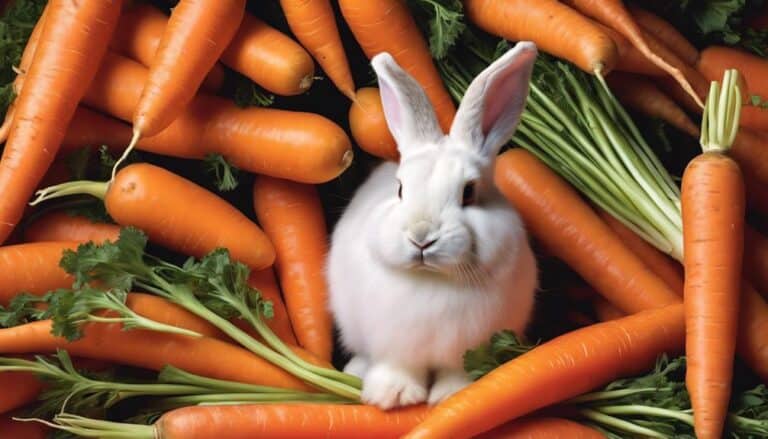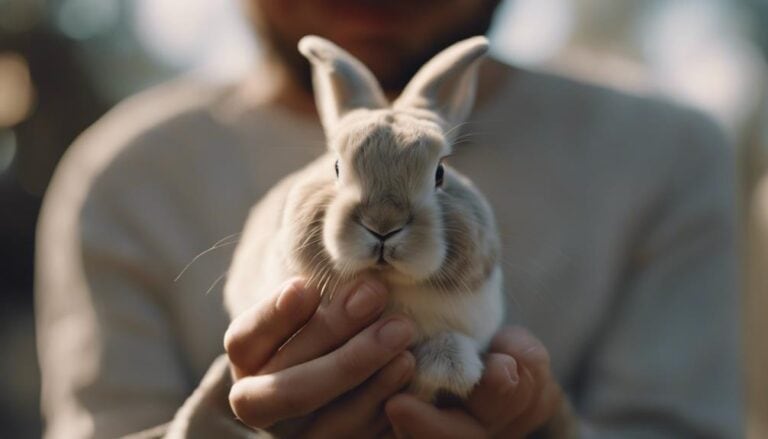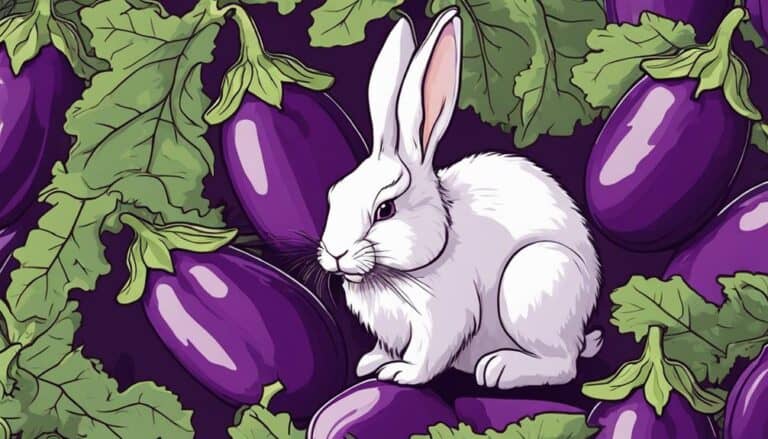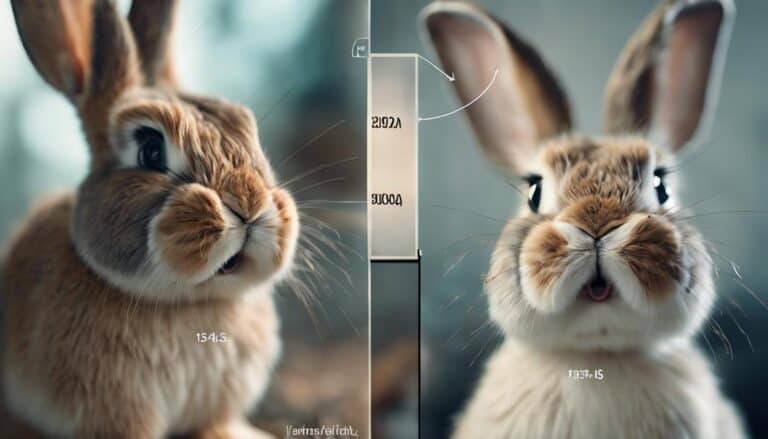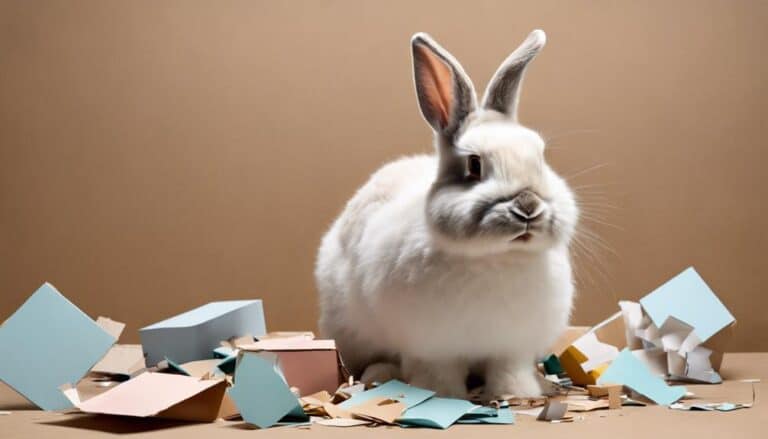Did you know that bunnies have a penchant for nibbling on various plants in your garden or yard?
However, when it comes to poison ivy, caution is critical.
While you might be wondering if bunnies can munch on this pesky plant, the answer requires careful consideration.
Before making any decisions about what your furry friends can eat, understanding the potential risks involved is crucial.
So, are you ready to uncover the truth about whether bunnies can safely consume poison ivy?
Contents
- 1 Key Takeaways
- 2 Potential Risks of Bunnies Eating Poison Ivy
- 3 Benefits of Bunnies Eating Poison Ivy
- 4 Tips for Keeping Bunnies Safe
- 5 Signs of Poison Ivy Ingestion in Bunnies
- 6 What to Do If Your Bunny Eats Poison Ivy
- 7 Prevention and Precautions for Bunny Owners
- 8 Frequently Asked Questions
- 9 Conclusion
Key Takeaways
- Bunnies can eat poison ivy without adverse effects and aid in controlling plant growth.
- Immediate veterinary care is crucial if a bunny ingests poison ivy for severe cases.
- Prevent access to poison ivy to avoid ingestion incidents and prioritize bunny safety.
- Poison ivy fiber contributes to wild rabbits' nutritional intake and aids in digestive health.
Potential Risks of Bunnies Eating Poison Ivy

Bunnies should always avoid consuming poison ivy due to its toxic nature containing urushiol, which can lead to various health complications. Ingesting poison ivy poses significant risks to rabbits, as it can trigger allergic reactions similar to those seen in humans. This toxic plant can cause skin irritation, gastrointestinal issues, and potentially more severe symptoms in bunnies. Skin irritation may manifest as redness, itching, or even blistering in rabbits. Gastrointestinal problems such as vomiting, diarrhea, or lack of appetite can also occur after ingesting poison ivy.
The health risks associated with bunnies consuming poison ivy shouldn't be underestimated. If you suspect that your rabbit has eaten poison ivy, it's vital to contact a veterinarian experienced in rabbit care promptly. A rabbit-savvy veterinarian can provide proper evaluation and treatment to mitigate any potential harm caused by the ingestion of this toxic plant. Remember, swift action is essential in safeguarding your bunny's well-being in such situations.
Benefits of Bunnies Eating Poison Ivy
When considering the consumption of poison ivy by rabbits, it's essential to acknowledge the potential benefits that may arise. Bunnies eating poison ivy can have some positive effects, as outlined below:
- Control Plant Growth: Rabbits can help control the growth of poison ivy in certain areas by consuming it regularly.
- No Adverse Effects: Due to their unique digestive system, bunnies can eat poison ivy without experiencing any harmful side effects.
- Fiber-rich Content: The fiber found in poison ivy can be beneficial for a rabbit's digestive health, aiding in proper digestion.
- Essential Nutrients: Poison ivy may offer some essential nutrients for wild rabbits, contributing to their overall nutritional intake.
Tips for Keeping Bunnies Safe

To guarantee the well-being of your rabbits, it's important to take proactive measures in safeguarding them from potential risks such as poison ivy exposure. Keep bunnies away from poison ivy to prevent skin irritation and discomfort.
Create a safe environment by regularly inspecting and removing any poison ivy plants in areas accessible to your bunnies. Offer alternative safe plants and treats to satisfy their natural chewing instincts and deter them from exploring harmful options.
If accidental exposure occurs, consult a rabbit-savvy veterinarian promptly for guidance. Remember, prevention is key to keeping your bunnies safe from the dangers of poison ivy.
Signs of Poison Ivy Ingestion in Bunnies
What're the telltale signs of poison ivy ingestion in rabbits? If your bunny has ingested poison ivy, there are some symptoms you should watch out for:
- Drooling: Bunnies may exhibit excessive drooling after consuming poison ivy.
- Lethargy: If your bunny seems unusually tired or lacks energy, it could be a sign of poison ivy ingestion.
- Gastrointestinal Issues: Look out for symptoms like diarrhea, vomiting, or a lack of appetite in your rabbit.
- Skin Reactions: Your bunny may experience itching, swelling, or other skin irritations due to poison ivy ingestion.
In severe cases, ingestion of poison ivy can lead to more serious health issues or even death in bunnies. It's important to seek immediate veterinary care if you notice any of these symptoms in your rabbit to prevent further complications.
What to Do If Your Bunny Eats Poison Ivy

If your bunny eats poison ivy, contact a rabbit vet immediately for guidance on symptoms and treatment.
Following the vet's advice promptly is important to minimize the effects of poison ivy ingestion.
Bunny Symptoms and Treatment
When a bunny ingests poison ivy, immediate veterinary care is crucial to prevent further complications. Here's what to do if your bunny eats poison ivy:
- Recognize Symptoms: Watch for signs like gastrointestinal distress, lethargy, or skin reactions after your bunny consumes poison ivy.
- Seek Veterinary Care: Contact a rabbit-savvy vet promptly for guidance and treatment to address any potential poisoning effects.
- Provide Supportive Care: Treatment may involve hydration, monitoring for adverse effects, and measures to alleviate symptoms.
- Prevent Access: Make sure bunnies can't reach poison ivy to avoid accidental ingestion incidents.
Contact Vet Immediately
Upon discovering that your bunny has ingested poison ivy, immediate contact with a rabbit-savvy vet is essential to guarantee swift and appropriate treatment. Quick action is imperative when dealing with poison ivy consumption in rabbits. Seeking professional help promptly can greatly reduce the impact of toxic plants like poison ivy on your pet's health. The RSPCA advises immediate veterinary care for rabbits that have consumed poisonous vegetation. Contact a rabbit vet without delay if you suspect your bunny has ingested poison ivy to secure their well-being. Here is a table to illustrate the key points further:
| Key Actions | Importance |
|---|---|
| Contact Rabbit Vet | Swift and appropriate treatment |
| Seek Prompt Help | Mitigate effects of poison ivy |
| Quick Action | Reduce impact on bunny's health |
| Follow Vet's Advice | Ensure proper care and recovery |
| Immediate Care | Essential for rabbit's well-being |
Prevent Future Incidents
After contacting a rabbit-savvy vet immediately upon poison ivy ingestion, the next step to focus on is preventing future incidents to safeguard your bunny's health. Here are key actions to take:
- Monitor Your Bunny: Watch for any signs of illness or adverse reactions post-consumption of poison ivy.
- Seek Veterinary Care: Act promptly and contact a vet if you notice any concerning symptoms.
- Follow Vet's Recommendations: Adhere to the guidance provided by the vet to address potential health issues effectively.
- Guarantee Quick Action: Promptly deal with any toxic plant ingestion incidents to guarantee your bunny's well-being.
Prevention and Precautions for Bunny Owners

Keep your bunnies safe by ensuring they steer clear of poison ivy, which can pose serious risks to their health.
Regularly check your bunny's surroundings for any signs of poison ivy and promptly remove them to prevent accidental ingestion.
Provide your bunnies with a variety of safe and rabbit-friendly vegetation as alternatives to poison ivy, reducing the chances of exposure to harmful plants.
Poison Ivy Risks
To safeguard your bunny's health, it's essential to be vigilant about preventing their access to areas where poison ivy grows. Here are some important prevention and precautionary measures you should take:
- Identification: Learn to identify poison ivy to keep your bunny away from it.
- Physical barriers: Use fencing or other barriers to block access to areas where poison ivy is present.
- Regular inspection: Routinely check your bunny's environment for any signs of poison ivy growth.
- Immediate action: If you suspect your bunny has ingested poison ivy, seek veterinary care promptly to prevent potential health issues.
Safe Alternatives
Provide your bunny with safe alternatives like apple twigs, berries, cucumber, dandelions, and grass to prevent them from ingesting poison ivy. Integrate rabbit-safe plants such as lavender, marigold, parsley, and peas into their diet as healthy alternatives.
Safeguard your garden by shielding rabbits from harmful plants, cultivating rabbit-safe options for enrichment, and fortifying the garden against predators. Recognize poisonous flora that can be detrimental to rabbits and conduct research to determine which plants are safe for their consumption.
Elevate your rabbit's surroundings by planting rabbit-safe greenery for foraging, thereby enriching their living space and ensuring their well-being.
Frequently Asked Questions
What Animal Can Eat Poison Ivy?
You can find animals like goats, deer, cows, horses, sheep, pigs, and chickens eating poison ivy. These creatures have unique diets and foraging habits that allow them to consume this plant without adverse effects.
What Should I Do if My Rabbit Eats Ivy?
If your rabbit eats ivy, it's important to act fast. Contact an emergency vet, monitor behavior, offer hay and water, call an expert, remove the plant, and stay calm. Quick response is essential for your bunny's well-being.
Which One Is Poisonous to Rabbits?
Rabbits should avoid poison ivy as it is toxic to them. Consuming poison ivy can lead to health issues due to its poisonous nature. Keep your bunnies away from this plant to guarantee their well-being.
Do Wild Rabbits Eat Ivy?
In the wild, rabbits may consume a variety of plants, including ivy, as part of their natural diet. Their digestive systems are adapted to handle certain toxic plants. Environmental factors influence their foraging habits and herbivore diet.
Conclusion
To wrap it up, remember that poison ivy isn't a safe snack for bunnies. Just like how you wouldn't want to touch poison ivy with your bare hands, you should also keep it away from your furry friends.
Picture your bunny happily hopping around in a garden free from harmful plants. Keep them safe and healthy by ensuring they steer clear of toxic foliage like poison ivy. Your bunny will thank you for it!

